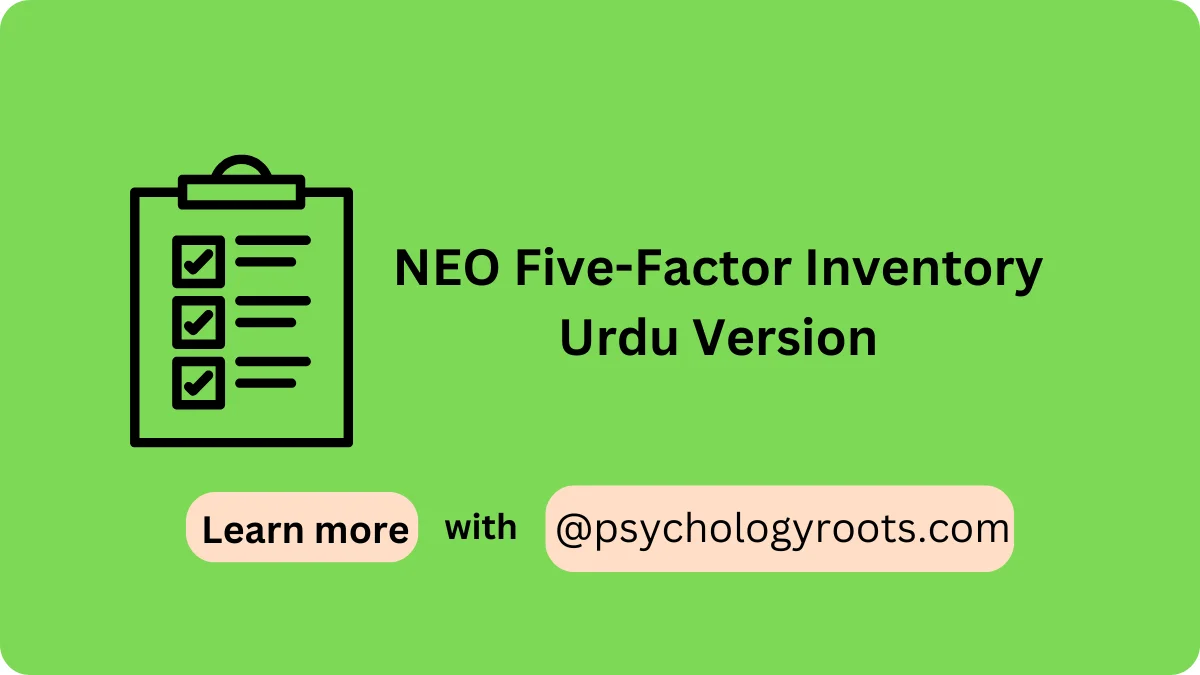Table of Contents
NEO Five-Factor Inventory Urdu Version
Here in this post, we are sharing the “NEO Five-Factor Inventory Urdu Version”. You can read psychometric and Author information. We have thousands of Scales and questionnaires in our collection (See Scales and Questionnaires). You can demand us any scale and questionnaires related to psychology through our community, and we will provide you with a short time. Keep visiting Psychology Roots.
About NEO Five-Factor Inventory Urdu Version
Scale Name
NEO Five-Factor Inventory Urdu Version
Author Details
Robert R. McCrae, Paul T. Costa Jr. (original NEO-FFI, 1987); Urdu translation by Farooq Naeem, Muhammad Ayub, and colleagues (2009)
Translation Availability
English, Urdu

Background/Description
The NEO Five-Factor Inventory (NEO-FFI) Urdu Version, adapted by Naeem et al. (2009) from the original NEO-FFI by McCrae and Costa (1987), is a 60-item self-report scale designed to assess the five major personality domains in adults: Neuroticism, Extraversion, Openness to Experience, Agreeableness, and Conscientiousness. Published in Journal of Personality and Social Psychology (original) and adapted for Urdu-speaking populations, the NEO-FFI is a shortened version of the 240-item NEO Personality Inventory (NEO-PI), measuring the Five-Factor Model (FFM) of personality. Each domain is assessed with 12 items, rated on a 5-point Likert scale (0 = “Strongly Disagree” to 4 = “Strongly Agree”). Total scores per domain range from 0–48, with higher scores indicating stronger expression of the trait.
The Urdu version was validated with 300 Pakistani adults (mean age ≈ 30 years, ~50% female, community and clinical samples), ensuring cultural and linguistic appropriateness through forward-backward translation and pilot testing. It correlates with the English NEO-FFI (r ≈ 0.70–0.85) and measures of psychological distress (r ≈ 0.40–0.60 for Neuroticism). The scale is used in clinical psychology, psychiatry, and research to assess personality traits, inform diagnostic formulations, and predict behavioral outcomes in Urdu-speaking populations. Access requires permission from PAR Inc. (original) or contact with the Urdu adaptation team.
Administration, Scoring and Interpretation
- Obtain the Urdu NEO-FFI from Naeem et al. (2009) or authorized sources (e.g., PAR Inc. for original, research contacts for Urdu version), ensuring ethical permissions.
- Explain to participants (adults 18+) that the questionnaire assesses personality traits, emphasizing confidentiality and voluntary participation.
- Administer the 60-item scale in a clinical, research, or community setting, using paper or digital formats, with instructions to rate statements based on typical behavior.
- Estimated completion time is 10–15 minutes.
- Ensure a private, supportive environment; provide mental health resources (e.g., crisis hotlines) and adapt for accessibility (e.g., oral administration for low literacy) if needed.
Reliability and Validity
The Urdu NEO-FFI demonstrates robust psychometric properties (Naeem et al., 2009; McCrae & Costa, 1992). Internal consistency is high (Cronbach’s alpha = 0.80–0.90 for domains: Neuroticism = 0.86, Extraversion = 0.82, Openness = 0.80, Agreeableness = 0.83, Conscientiousness = 0.88) based on 300 Pakistani adults. Test-retest reliability over 4 weeks is strong (r ≈ 0.75–0.85). Convergent validity is supported by correlations with the English NEO-FFI (r ≈ 0.70–0.85) and Symptom Checklist-90-Revised (r ≈ 0.40–0.60 for Neuroticism).
Factorial validity confirms a five-factor structure, consistent with the FFM, explaining 50–60% of variance. Criterion validity is evidenced by its ability to differentiate clinical (e.g., anxiety disorders) from non-clinical samples and predict outcomes like job performance. Discriminant validity is shown by weak correlations with unrelated constructs (e.g., general intelligence, r < 0.20). Pairing with measures like the Inventory of Interpersonal Problems or Urdu-translated anxiety scales enhances comprehensive assessment.
Available Versions
60-Items
Reference
McCrae, R. R., & Costa, P. T. (1987). Validation of the five-factor model of personality across instruments and observers. Journal of personality and social psychology, 52(1), 81.
Naeem, F., Ayub, M., & Kingdon, D. (2009). Cross-cultural validation of the NEO Five-Factor Inventory in Pakistan. Journal of Pakistan Psychiatric Society, 6(2), 80–85.
Malik, N. I., Saleem, S., Ullah, I., Rehan, S. T., De Berardis, D., & Atta, M. (2023). Psychosocial Factors Affecting Drug Relapse among Youth in Punjab, Pakistan. Journal of clinical medicine, 12(7), 2686. https://doi.org/10.3390/jcm12072686
Important Link
Scale File:
Frequently Asked Questions
What does the NEO Five-Factor Inventory Urdu Version measure?
It measures five personality domains: Neuroticism, Extraversion, Openness, Agreeableness, and Conscientiousness.
Who is the target population?
Adults (18+) in Urdu-speaking clinical or community settings.
How long does it take to administer?
Approximately 10–15 minutes.
Can it inform interventions?
Yes, it informs personality-based treatment planning and outcome prediction.
Disclaimer
Please note that Psychology Roots does not have the right to grant permission for the use of any psychological scales or assessments listed on its website. To use any scale or assessment, you must obtain permission directly from the author or translator of the tool. Psychology Roots provides information about various tools and their administration procedures, but it is your responsibility to obtain proper permissions before using any scale or assessment. If you need further information about an author’s contact details, please submit a query to the Psychology Roots team.
Help Us Improve This Article
Have you discovered an inaccuracy? We put out great effort to give accurate and scientifically trustworthy information to our readers. Please notify us if you discover any typographical or grammatical errors.
Make a comment. We acknowledge and appreciate your efforts.
Share With Us
If you have any scale or any material related to psychology kindly share it with us at psychologyroots@gmail.com. We help others on behalf of you.